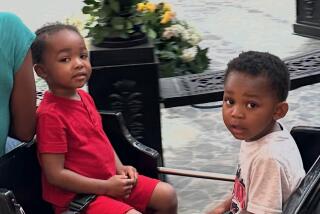A Woman’s Choice Proves Fatal as Leukemia, Pregnancy Intersect : Oregon: Jeff Barton can’t quiet the ‘what-ifs’ that haunt his soul. But his wife’s best friend finds solace in rearing a legacy, the twins.
- Share via
SPRINGFIELD, Ore. — Since his wife died, Jeff Barton walks more slowly to the parking lot at Sacred Heart Hospital, where he works as a nurse’s aide. He drives more slowly on the way home.
Home is where the “what-ifs” come over him. What if he had insisted that she abort the twins? Would the bone-marrow transplant have saved her from the leukemia if she hadn’t waited for the babies to be born? Would she have been able to keep loving him, thinking the price of her own life had been the lives of two babies?
That’s when he sits in the chair--listening to music, taking deep breaths--and lets the phone ring.
“All I’m thinking of is Barb, right now,” he said. “I still have to do a lot of wondering why this is happening. I don’t blame God, but ‘Why?’ is my question.”
While Jeff grapples with how his wife, Barbara, died, a few miles away in another house, her best friend holds the twins, Hunter and McKenzie, now a year old, filling in for the mother they will never know.
A divorced mother of three sons, aged 11 to 17, Piper Shanks wonders whether she should encourage the twins to call her “Mama” as they learn to talk.
“I guess the answer is waiting for them to be old enough to decide,” she said. “So I don’t know what they call me. Maybe ‘Barb’s hands.’ She obviously isn’t here to hold them.”
Piper and Barb had been best friends since junior high school, when Barb moved in three houses away. When they grew up, they worked side by side as receptionists in the radiology department of Sacred Heart Hospital in Eugene, where Piper is now a supervisor. They were in each other’s weddings, and Piper was in the delivery room with Jeff and Barb for the births of all three of their children.
Jeff and Barb met at the hospital. He would see her when he brought in patients for X-rays.
“Right after work one night, we went to the coast and sat on the beach and watched the sunset,” he recalls. “We were married six months later.”
But it was eight years before they succeeded in having a child, a daughter named Taylor, now 5.
“We started right after Taylor trying to have a second child,” Jeff said.
There were a couple of miscarriages. Then one morning a home pregnancy test told Barb she was pregnant again. She went to the doctor for a blood test to confirm it.
“They said yes, she was pregnant, but there was an abnormality. Her white cells were elevated,” Jeff said.
It was chronic granulocytic leukemia, a fatal disease that hits adults in their 20s and 30s. Barb was 35. She had had no idea she was sick. The only symptom was a tightness in her abdomen, caused by enlargement of her spleen.
They talked about whether she should have an abortion to go ahead as quickly as possible with the bone marrow transplant, which would give her a 50-50 chance of survival. The doctors told them it could take six months to a year to find a donor. By that time, the baby could be born. It was the beginning of the “what-ifs.”
Then they went in for an ultrasound scan and saw that there were two hearts beating, not just one. For Barb, it was a sign that she could have it all--give birth to the babies and still beat the leukemia.
In her journal, she wrote, “Carrying the babies became my first big goal, which made it easier to take one day at a time.”
Jeff decided to go along with her, though he knew it might mean losing his wife.
“She was bound and determined to have the kids and beat the leukemia. The doctors felt we had that time,” he said. “I decided I would have to help my wife go through this in the easiest way she [could], so I sat back for nine months and bit my nails.”
Barb was able to take some chemotherapy without hurting the fetuses. Her white blood cell count went down. Her brother turned out to be a match for a bone-marrow transplant. Things looked as if they would work out.
The twins were born on July 13, 1994. But, after two weeks, the leukemia took a turn for the worse. Jeff dropped off his three children at Piper’s house and drove Barb to Stanford University Hospital in California. The doctors told them Barb still had a good chance, but it was lower now, just 25%.
She went through massive doses of chemotherapy and radiation treatment before the transplant. But her condition deteriorated. When the doctors said there was little hope, Jeff took his wife back to Oregon.
That’s when Piper asked Barb what she wanted for the twins.
“She didn’t bring it up, I did: ‘If anything happens to you, who do you want raising your kids?’ Barb, without any hesitation, looked at me and looked at Jeff and said, ‘You and Jeff, unless you don’t want to.’ I said there was no question of wanting to.”
“Barb knew,” Jeff said. “She said, ‘I have absolutely no problems with your ability as a father in terms of love and kindness. I want my kids to have the mothering part you will not be able to give them.’ ”
Barb died Jan. 22.
Piper drops the twins off at the same day care center where Jeff drops Taylor. He plays with them when he picks up Taylor after work. He has started having the twins spend the night at his house from time to time. And they have started calling him “Dada.”
“I think he [feels] a tremendous amount of hurt when he looks at the babies, because they represent Barb’s death,” Piper said. “I’ve told him he’s got to let go of that.
“I think there is some remembrance there.”
Unlike Jeff, Piper said she felt her grief most watching her best friend die.
“I’ve had a lot of people ask me, ‘What are you doing to help yourself heal?’ ” she said. “I say, ‘I’m raising her kids.’ ”
More to Read
Sign up for Essential California
The most important California stories and recommendations in your inbox every morning.
You may occasionally receive promotional content from the Los Angeles Times.













